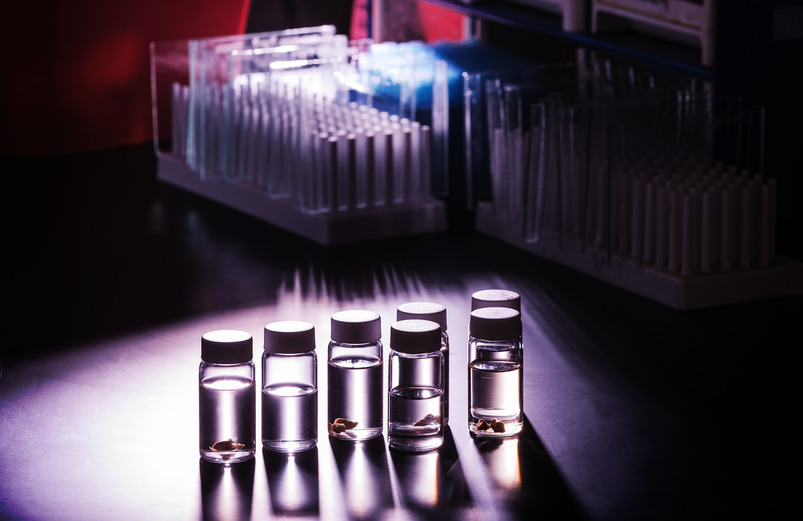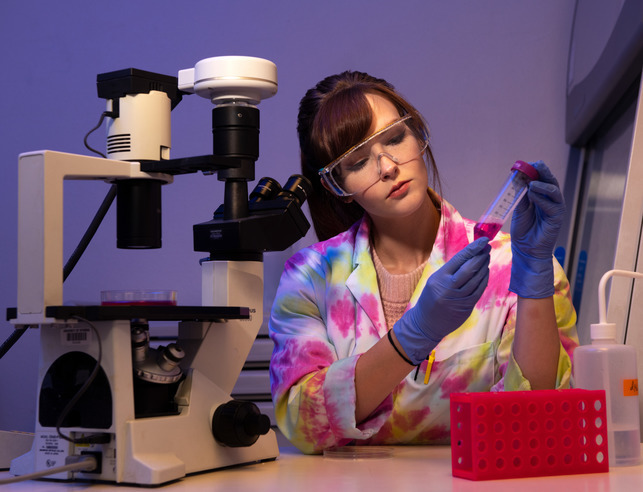Research & Teaching
Students will conduct original, innovative research culminating in a publishable dissertation. The preferred format consists of journal-ready chapters, with students expected to demonstrate lead authorship on published articles derived from their dissertation. Effective teaching is also a crucial part of academic and professional development, strengthening comprehension, broadening perspectives and refining communication and critical thinking skills. All students will engage in a hands-on teaching experience during their program and are encouraged to pursue the Certificate in College Teaching, as recommended by their Dissertation Committee.
Cards Carousel Slider
Faculty & Staff
Our Biomedical Sciences faculty bring diverse expertise from across campus, uniting specialists in research, innovation and education. With backgrounds spanning multiple disciplines, they drive groundbreaking discoveries and mentor the next generation of scientists.
Meet Our PeopleProgram Admission
To apply to the Biomedical Sciences Ph.D. program, you must complete both the general graduate admissions process and the program-specific admission requirements. If you have any questions about the application process, be sure to reach out to us!
Curriculum
The Biomedical Sciences graduate program offers a distinctive research training environment, equipping students with diverse scientific approaches to tackle complex health-related challenges.
Financial Aid & Graduate Assistantships
Competitive graduate assistantships cover tuition, fees, health insurance and a 9-month stipend. Summer funding may be available. All biomedical sciences students, including those with GAs, gain valuable research and teaching experience to build essential professional skills. Consult your faculty advisor for details.
International Students
The Biomedical Sciences Ph.D. program at the University of Wyoming is a diverse, global community with broad faculty and student representation. International students are a vital and integral part of the program.
Degree Information
Explore the University of Wyoming's Biomedical Sciences Ph.D. program to see if it’s the right fit for you. Gain hands-on research experience and prepare for a career in academia, healthcare or industry!
Data Science Track
The data science track in the Biomedical Sciences Program trains Ph.D.-level scientists to analyze complex datasets for biomedical solutions through an interdisciplinary curriculum in biology, statistics and computer science.
Learning Outcomes
The biomedical sciences program offers a dynamic blend of formal coursework and hands-on discovery experiences, equipping students with the skills, behaviors, and aptitudes necessary for leadership and long-term success in the biomedical field. While deep disciplinary knowledge serves as the foundation for independent thinking and innovation, the program also emphasizes competency in information assessment, synthesis and integration. Students develop strong communication skills to translate complex findings to diverse audiences, collaborate effectively in teams and refine leadership and project management abilities.
Graduates of the biomedical sciences program emerge as skilled experimentalists, problem solvers and critical thinkers with expertise in their fields and a broad understanding of research methodologies. Beyond technical proficiency, the program fosters qualities essential for professional success, including ethical leadership, mentorship and collaboration. Students gain experience in designing and conducting independent research, publishing in peer-reviewed journals and teaching at the undergraduate or graduate level. They leave the program prepared to communicate their work effectively, mentor future scientists, and contribute meaningfully to their field.

Program of Study
The program of study is designed according to student learning goals and research opportunities. It blends depth and breadth of preparation by providing broad core requirements with electives promoting specialization in a "parent" discipline. This is recognized on program documentation by a Doctorate in Biomedical Sciences/"specialization" area. For example, Doctorate in Biomedical Sciences/Reproductive Biology.





